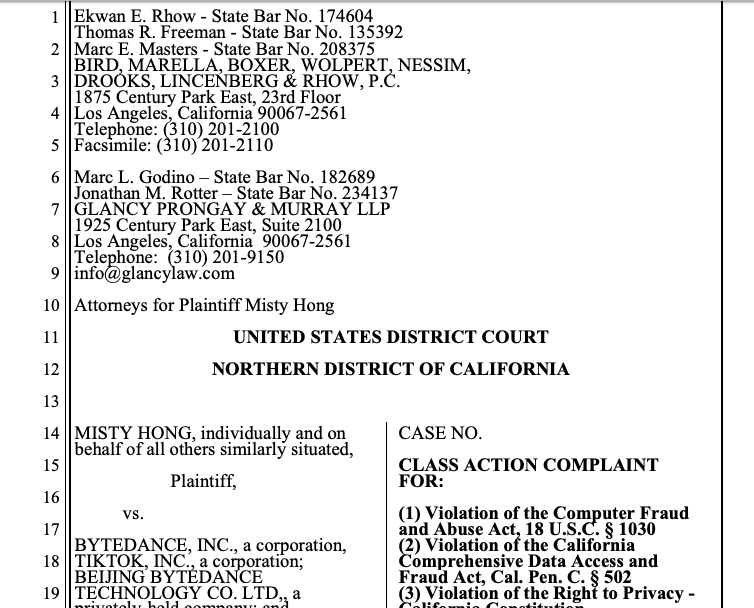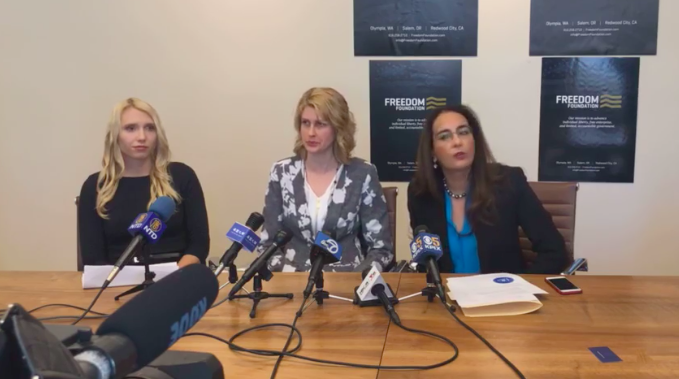
Class-Action Lawsuit Filed in California Against Multi-Billion Dollar TikTok
U.S. Military banned from using Chinese owned TikTok due to security threats
By Michelle Mears, January 7, 2020 7:08 am
The Pentagon has reversed its policy on TikTok. The popular Chinese owned social media app is now considered a security threat. The Army was using the app as an effective tool to reach young Americans as a recruiting tool. Lt. Col. Robin Ochoa, a spokesman for the Army reported the app will no longer be allowed on government-issued phones.
The Beijing based company that owns the music video app is ByteDance. Army recruiters were using the app, but in October Sen. Tom Cotton R-Arkansas and Sen. Chuck Schumer D-New York requested an investigation by intelligence officials to determine if the app was a security threat to the United States.
Although a security probe was started the Army continued to use the app until December.
The U.S. Navy also issued a warning and banned the app from being used on their government-issued phones. Gizmodo reported the the policy reversal came after the release of a Defense Department Cyber Awareness Message stating, “TikTok has potential security risks with its use.
The Department of Defense directed all employees to, “To be wary of applications you download, monitor your phones for unusual and unsolicited texts etc., and delete them immediately and uninstall TikTok to circumvent any exposure of personal information.”
The service members can use the Chinese owned app on their personal phones but military leaders are asking service members to be cautious when using any social media platform, especially if they receive random or unfamiliar text messages, according to Ochoa.
The Navy Marine Corps Intranet stated Wednesday in a user bulletin, that anyone with the TikTok app on their mobile devices wouldn’t be allowed to use the intranet.
“This decision was made based on cybersecurity threat assessments, and is consistent with 10th Fleet efforts to proactively address existing and emerging threats in defense of our networks,” Cmdr. Dave Benham, 10th Fleet and U.S. Fleet Cyber Command spokesman, said in a statement.
ByteDance acquired Musical.ly in November 2017 for $800 million to $1 billion. Musical.ly, was an app popular with teenagers who made homemade karaoke videos. It had about 60-million users in the United States and Europe.
The FBI, in 2015 blamed Chinese hackers on the breach of more than 21-million records from the Office of Personnel Management.
According to a lawsuit filed in California against ByteDance and TikTok, “Beijing ByteDance had $7.2 billion in annual revenue for the year 2018. It has far surpassed this number in 2019, booking $7 billion to $8.4 billion in revenue in a better-than-expected result for the first half of 2019.”
Beijing ByteDance is currently worth between $75 billion and $78 billion. Investors include Sequoia Capital China, Russian billionaire Yuri Milner, Japanese technology giant SoftBank, and big private-equity firms such as KKR, General Atlantic, and Hillhouse Capital Group
President Trump has already placed Huawei and other Chinese tech firms on a blacklist. This blacklist prevents the companies from purchasing American products due to national security and human rights issues. Trump also placed tariffs on more than $360 billion of Chinese products.
The CEO of Huawei was arrested in Canada in December 2018 and extradited to the United States. Meng Wanzhou was facing charges in Eastern District of New York. The Wall Street Journal reported last April the U.S. Justice Department was looking into Huawei violating US sanctions on Iran.
Wanzhou is on bail, living in one of her multimillion-dollar homes in Vancouver. Wanzhou’s hearing is set to begin Jan. 20, in Canada and has not yet been extradited to the United States.
TikTok has been accused of being a threat to the nation’s youth. The company was forced to pay $5.7 million in fines by the Federal Trade Commission to settle the “the largest civil penalty ever obtained by the Commission in a children’s privacy case.” TikTok now must also comply with the Children’s Online Privacy Protection Act and take down any videos uploaded by users under 13.
The class-action lawsuit was filed in December by student, Misty Hong, who initiated the lawsuit states she downloaded the app but she never created an account. Despite not creating an account TikTok took it upon themselves to create one using the Hong’s personal data sending it to Chinese servers.
The company ByteDance is a Delaware Corporation and TikTok is a California Corporation and has offices in Palo Alto, Culver City and Mountain View.
The lawsuit is claiming TikTock did the following:
1. Violated the Computer Fraud and Abuse Act, 18 U.S.C. § 1030
2. Violated the California Comprehensive Data Access and Fraud Act, Cal. Pen. C. § 502
3. Violated the Right to Privacy – California Constitution
4. Intrusion upon Seclusion
6. Violated the California Unfair Competition Law, Bus. & Prof. C. §§ 17200 et seq.
7. Violated the California False Advertising Law, Bus. & Prof. C. §§ 17500 et seq.
8. Negligence
9. Restitution / Unjust Enrichment
TikTok wrote in a statement in October in response to the accusations from the United States Government saying, “We take these issues incredibly seriously. We are committed to transparency and accountability in how we support our TikTok users in the US and around the world.”
TikTok further stated, “We store all TikTok US user data in the United States, with backup redundancy in Singapore. Our data centers are located entirely outside of China, and none of our data is subject to Chinese law.”
The class action lawsuit accuses ByteDance of secretly collecting data on users and transferring private data to China.
Schumer tweeted, “It’s (TikTok) owned by a Beijing-based tech company. It’s required to adhere to Chinese law. That means it can be compelled to cooperate with intelligence work controlled by China’s Communist Party.”





One thought on “Class-Action Lawsuit Filed in California Against Multi-Billion Dollar TikTok”